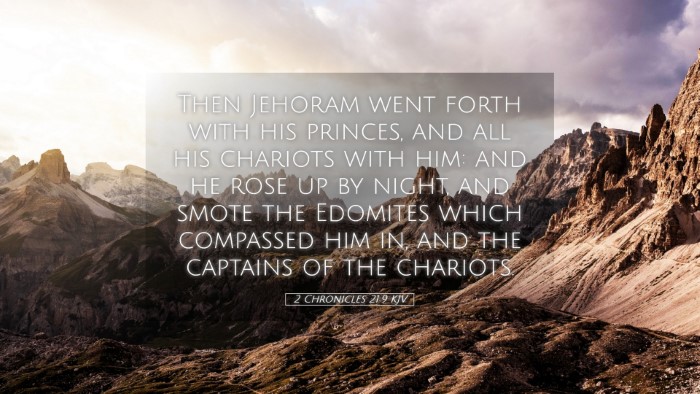Commentary on 2 Chronicles 21:9
In 2 Chronicles 21:9, we observe a significant and troubling moment in the history of Judah, where King Jehoram's actions bring both judgment and consequence. The verse states:
"So Jehoram went out unto the people, and he took the cities which were in the land of Judah, and the inhabitants of Jerusalem, and they killing every kindred of them that had ruled in the land, and he was the Lord’s witness against them."
Contextual Overview
To understand this passage, we must consider the historical and theological context. Jehoram, the son of Jehoshaphat, ascended to the throne of Judah during a time of relative peace and prosperity. However, his reign was marked by idolatry and wickedness, influenced by his marriage alliances with the house of Ahab in Israel. This commentary seeks to delve into the implications of his actions and their consequences as presented in this verse.
Insights from Matthew Henry
Matthew Henry, in his exposition, emphasizes the gravity of Jehoram's choices, remarking that:
-
Failure of Leadership: Jehoram demonstrated a failure to lead the people in righteousness. His alliance with Ahab's family led him astray and away from the worship of Yahweh, leading to destructive practices that invited divine judgment.
-
Consequences of Idolatry: The act of killing all of the royal family shows the extent of his corrupt reign. Henry notes that this was an act not only of political purging but also a reflection of the corrupting influence of pagan worship.
-
Judgment of God: Jehoram’s actions brought about God’s righteous judgment against Judah, demonstrating the principle that national leadership reflects the moral state of the people.
Insights from Albert Barnes
Barnes provides critical thoughts on the narrative with particular attention to:
-
The Significance of Jehoram's Actions: Jehoram's choice to kill off rivals was indicative of his insecurity as a ruler, one who, devoid of divine guidance, resorted to violence to maintain his power.
-
Context of the Event: The historical backdrop of Kings and their devastating choices highlights the recurrent themes of rebellion against God and the resulting divine disciplines throughout Israel’s history.
-
Spiritual Implications: Barnes notes that Jehoram's reign serves as a cautionary tale to leaders about the spiritual and moral ramifications of aligning with evil influences and abandoning righteousness.
Insights from Adam Clarke
In his comprehensive commentary, Adam Clarke provides an analysis that focuses on several essential aspects:
-
Nature of Jehoram's Reign: Clarke analyzes Jehoram's actions as reflective not only of his character but also of the demise of the Davidic line, which ultimately leads to God's covenant judgments.
-
Theological Reflection: Clarke emphasizes that Jehoram’s character, defined by violence and idolatry, serves as a stark reminder of the consequences of forsaking God’s covenant in every leadership role.
-
Call for Righteousness: His commentary suggests that believers today should heed this historical account as a stark warning regarding the importance of remaining faithful to God's decrees, lest they invite upon themselves similar judgment.
Conclusion
The commentary on 2 Chronicles 21:9 with insights from Matthew Henry, Albert Barnes, and Adam Clarke provides a rich tapestry for pastors, students, and theologians. It underscores the themes of leadership accountability, the consequences of idolatry, and the need for righteousness in governance.
As leaders today engage with this historical narrative, it serves as an essential reminder of the weight of their responsibilities before God and the people they serve. Jehoram's reign remains a profound warning—a call to righteous living and faithful leadership reflecting God's truth amidst cultural co-optation.


